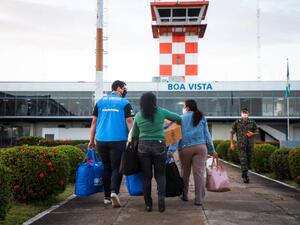UNHCR and IOM start moving Malian refugees to new camp in Niger
UNHCR and IOM start moving Malian refugees to new camp in Niger

Malian refugees in Niger in happier times.
NIAMEY, Niger, June 1 (UNHCR) - The UN refugee agency has started helping to move more than 11,500 Malian refugees from spontaneously established border settlements to a new managed camp deeper inside Niger.
UNHCR is conducting the exercise with one of its key partners, the International Organization for Migration (IOM). The refugees are being moved from five sites in Niger's Ayorou area to the new camp in Tabarebarey. Local authorities have provided essential assistance.
A first convoy of 14 trucks, carrying some 500 people with their belongings and livestock, left the Mbeidou site on Tuesday. Most of the refugees hailed from Tamakaza and Labbezanga in Mali and had fled to Niger in January to escape fighting between government forces and Tuareg rebels.
The refugees had earlier taken part in a sensitization programme to explain why they were being advised to move to a managed site inland, where it was safer and their needs could be better and more regularly met. The IOM also organized medical screening for the refugees before departure for Tabarebarey, which is almost 40 kilometres away from the border.
At the new site, families of six people or more will stay in tents, while others will be given material for shelter such as plastic sheeting. Water will be trucked in and stored in special bladders, while Médecins Sans Frontières has established a primary health post. Latrines and washing facilities have been constructed.
UNHCR will organize the provision of hot meals and the distribution of non-food items to all refugees on arrival at the camp, including soap, sleeping mats, blankets, kitchen utensils, buckets, jerry cans and more.
Ali, who moved to the camp with his eight children and two wives, said he was grateful for the welcome and assistance from the host community and humanitarian agencies. He thought more people will arrive soon. "We have been in touch with our friends and relatives in Mali. We hoped the situation would not last long, however things are getting worse," he said, adding that "most of all there is no food." Food and water shortages are a problem throughout the arid Sahel region.
By Mariata Sandouno in Niamey, Niger








